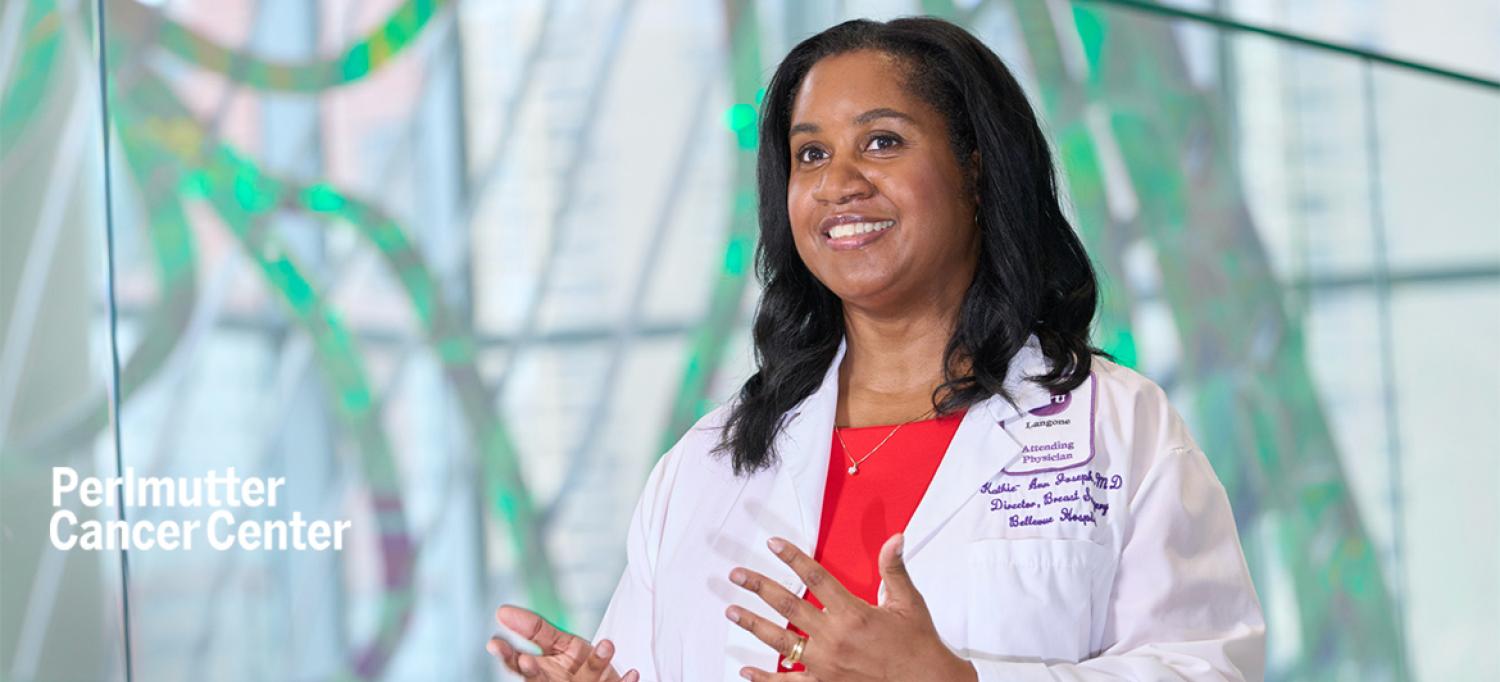Dr. Kathie-Ann Joseph Urges Black Women to Talk to Their Families & Doctors to Better Understand Their Risk of Breast Cancer

Kathie-Ann Joseph, MD, MPH
photo: NYU Langone staff
Breast surgeon Kathie-Ann Joseph, MD, MPH, has an important message for Black women: Odds are you’re at higher risk for breast cancer than you realize, and so you need to be screened for breast cancer early and often.
“Black women need to have a discussion with their primary care doctors no later than the age of 30 about what their risk is for developing breast cancer so that they know when they should start screening,” says Dr. Joseph, who is also vice chair for diversity and health equity in the Department of Surgery at NYU Grossman School of Medicine.
The main reason? Some widely unknown facts, unearthed and compiled by Dr. Joseph in a landmark 2022 study published in the Annals of Surgical Oncology. According to the results of the multicenter study, Black women:
- have a 42 percent greater risk of death than White women when diagnosed before age 50
- are more likely to get a diagnosis at later, harder to treat stages of disease than White women
- are more likely than White women to get a diagnosis without having had a single screening exam, such as a mammogram
- tend to get a breast cancer diagnosis at younger age than White women
“The U.S. Preventive Task Force recommendations of optional screening mammograms every two years starting at age 40 don’t go far enough for Black women, according to our findings,” says Dr. Joseph, who treats patients at the Breast Cancer Center, part of NYU Langone’s Perlmutter Cancer Center. “All women, and particularly Black women, who have a family history of breast cancer, can’t wait until 40. You need to start screening earlier.”
“Find out if your grandmother, mother, or other family members had breast cancer or ovarian cancer. And tell your doctor. Because family history is a red flag, and you should ask for genetic testing.”
—Kathie-Ann Joseph, MD, MPH
That means speaking to your doctor about your family history of cancer to determine when is the best time to get your first screening mammogram, which could be earlier than 40.
Black Women’s Genetic Risk of Breast Cancer
At least 10 genetic mutations linked to breast cancer have been identified. But because they have been studied most in women with European ancestry, there has been a misconception that these mutations did not occur in Black women. As a result, there has been little clear knowledge about Black women’s genetic risk for breast cancer.
New data show that Black women carry the three mutations most highly associated with breast cancer, BRCA1, BRCA2, and PALB2, at equivalent rates as seen in White women.
“Family history is something that, unfortunately, isn’t talked about enough in the Black community. Find out if your grandmother, mother, or other family members had breast cancer or ovarian cancer,” says Dr. Joseph. “And tell your doctor. Because family history is a red flag, and you should ask for genetic testing.”
More Aggressive Cancer and Delayed Treatment
Black women are twice as likely to have triple-negative breast cancer, which is known for being an aggressive disease whose treatment is limited to chemotherapy.
“Triple negative tends to be prevalent in West African countries as well, and tends to be associated with a BRCA1 mutation,” says Dr. Joseph.
We offer breast cancer services, including screening and genetic testing, in Manhattan, Brooklyn, and Queens and on Long Island. Find a Breast Cancer Center provider near you.
Compounding the problem of a difficult-to-treat disease is the fact that Black women are more likely to get a diagnosis at later disease stages. According to Dr. Joseph’s research, in White women, 67 percent of cancers are detected before they metastasize and spread past the breast. But in Black women, only 50 percent of cancers are caught before they spread elsewhere. Cancers detected before they spread are easier to treat and have a lower mortality risk. This is another indication of the need for earlier screening.
Going Beyond Breast Cancer Screening Guidelines
Each year nearly 300,000 women get a breast cancer diagnosis, and nearly 10 percent of them are under age 45. The U.S. Preventive Services Task Force, which makes screening recommendations for a host of different conditions, recently changed their guidelines to biannual screening starting at age 40.
But earlier and annual screening might be needed for many Black women, and any woman with a family history of breast or ovarian cancer in a parent, sibling, or child.
“Talk to your physician, and if you are at higher risk due to family history, you likely need to start screening at 40 or even earlier,” Dr. Joseph says.

